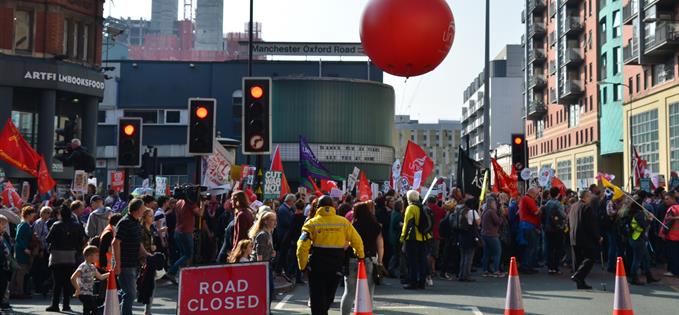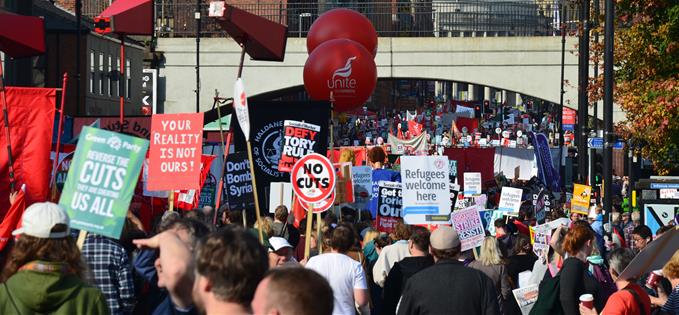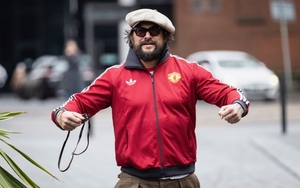“THIS is no flash in the pan,” says Neil McInroy of Manchester-based think tank Centre for Local Economic Strategies. “We are at the beginning of a new age. We are in a period of deep and challenging change including on-going global economic turbulence, social recession and local economic recessions, climate change, changing demography such as ageing, migration, and a growing divide between haves and have nots. All of these mean we face huge challenges locally, nationally and worldwide.”
We are in uncharted territory. This is the start of a new politics...
McInroy is answering a question I’d posed. This was: Can we say the Conservative Party Conference in Manchester, the TUC rally on Sunday, Jeremy Corbyn's election and appearance at Manchester Cathedral - following on from the Scottish Referendum and the General Election result - indicate a welcome shift in political engagement, or will it be a flash in the pan?
McInroy's next words are even more direct, stirring even, terrifying perhaps.
“The old paradigm is dissolving,” he says. “We are in uncharted territory. People know this. The political class know this. We are all building something new. But we don’t know what it is yet. It will take time… but the future will not be socialism and it won’t be capitalism, but it will be something which is reflective of our individualism, but involve new forms of self organising and communing. This is the start of a new politics."
The Conservative Conference in Manchester has certainly felt very different this year. If McInroy is right we're at the beginning of a process and it will become more pronounced.
"Two years ago in Manchester during the last conference, there was nothing of this antagonism and naked aggression," said a would-be Conservative councillor from London I met on a guided tour of the city that included some bemused Scandinavian tourists. "It's not pleasant to have a six or seven very angry men and women shouting the word 'scum' at you 10cms from your face when all you've done is turn up for your party conference and been polite to everyone you've met in the city. We are a pluralistic society, those people didn't seem to agree. They had closed minds and wouldn't listen to anything I said."
Manchester councillor Joan Davies, a Labour Party member for decades, was also a targeted. "I had a serious conversation with four young men, one of whom had attempted, against his better nature I hope, to swear at me in the mistaken belief I was a Tory. I convinced him I wasn't a Tory; but only went a little way to getting him to reconsider his mode of political opposition. I'm with Jeremy Corbyn. Protesting against what this government is doing is of course right but there are certain aspects - spitting, screaming 'scum' in people's faces - which I would happily say goodbye to this instant."
Back to our Conservative Party member on the tour and also McInroy's 'self organising and communing' point. "Social media is feeding the anger. I feel the vile language and vulgarity we used to complain about from Tweeters - that internet warrior thing - has transferred to how some people feel they can behave in public."
 Keeping the red balloon flying
Keeping the red balloon flyingManchester Councillor Pat Karney, makes a similar point, "While it's too early to say whether this is a new era in politics, what's new and unstoppable is the way social media is challenging elites across the world and enabling people to get organised."
This was in evidence during this conference, protesters were often grouped in loose combinations of a Left that lies way beyond Jeremy Corbyn, groups such as the People's Assembly or Class War. I bumped into six of the latter at the TUC's rally on Sunday, they had a list of grievances as long as my arm against the Tories, including what might turn out to be David Cameron's poll tax, the cuts in tax credits. They felt it was time to get aggressive. None of the Labour Party members I talked to condoned any of that talk. Meanwhile one shouty protester I attempted to engage in conversation outside the conference turnstiles, a man in his sixties who refused to give his name, wondered if I were MI5 when I asked him if he were part of any organisation.
 The TUC Rally
The TUC RallyThe anger of the protesters wasn't the only element in evidence during the Conservative Conference, as Joan Davies, Pat Karney and others were keen to point out. The 60,000 plus TUC rally on the Sunday was a triumph for the organisers. It drew in huge support from across the nation, from all generations, it was good-humoured, enthusiastic, even uplifting. There were some troublemakers but they made a needle in a haystack look easy to find.
If you were around or involved in the politics washing over the city during the conference it'd be hard not to conclude that Britain is more polarised than at any time since the 1980s. In that case McInroy provides a strong list of local, national and global challenges which lie at the heart of the problem and also appear to have widened the distance between politicians and the average citizen in the democracies. The fence - in place for terrorism reasons - barracading the Conservative Party from the rest of Manchester seemed an apt metaphor.
Others aren't so sure about the rise of political engagement.
David Pringle, the Co-operative Group's Director of NOMA, the large redevelopment of north-central Manchester, thinks it may fade once the next contentious issue is settled. "The current engagment in politics, I suspect, is a result of individuals’ experiences during the recession and the perceived threat of mass migration. There has been a shift in sentiment both wanting to ensure that recession does not happen again but also wanting to influence how economic prosperity is shared. Yet I feel as society prospers so people will move on. This level of interest in politics will continue until the EU referendum as this is very close to people’s hearts, after this I suspect interest will wane."
He might be right to be cautious over 'active politics'. I walked from Exchange Square to the Sunday rally. In and around Market Street and the Arndale huge numbers of people were shopping and strolling. If not unaware of the events taking place elsewhere in the city, they were certainly not moved to join in.
As one commentator said, "The Conservative Party Conference and associated TUC rally would have happened anyway. Corbyn is possibly a different thing altogether but it's too early to say. If he can engage with a wider population than those at a TUC led rally or those activists/protesters who would normally step forward then we could have an 'SNP moment' in England and Wales."
That's the puzzle.
Does the present noise surrounding Corbyn's new politics and the rise of the 'self organising' political groups constitute a fundamental shift in politics? Or is it just something for over-excited commentators to chat about? Maybe what people who have observed conferences and rallies in close order can agree upon is that while overall political engagement may not have drastically increased across the country, the mood has darkened. Maybe as McInroy states, 'we are at the start of a new politics'. Maybe it's going to get much darker.
You can follow Jonathan Schofield on Twitter @JonathSchofield or connect via Google+













